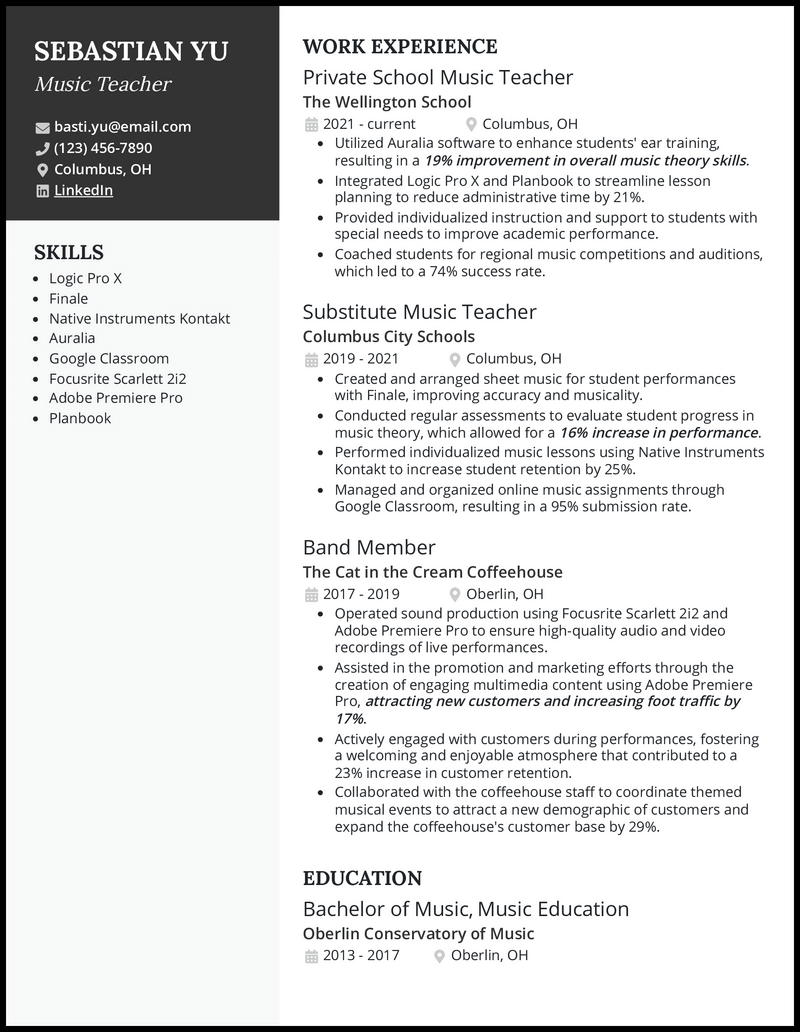You’re both a patient educator and a creative soul passionate about music. As a music teacher, every day revolves around teaching your students all about music, be it theory, singing, or playing an instrument.
Your students adore you, inspiring them to pursue their musical dreams, a testament to your abilities as a fantastic music teacher. This and other qualities can be challenging to encapsulate in a resume, especially if you’re not using a professional resume template.
That’s where we come in. Our music teacher resume examples and cover letter generator helped thousands of people, creatives and educators alike, land new roles. Here’s what to do!
Related resume examples
What Matters Most: Your Knowledge of Music & Teaching Skills

The skills—ah, the skills… There’s almost no limit to how many skills a teacher needs to excel at their job, is there? Fortunately, you’ve got what it takes: a strong foundation in music and the ability to work with students of various ages and backgrounds.
While teaching people of all ages requires many soft skills, such as communication and diversity training, it’s best to let those things shine during the interview. Use your resume to focus on your technical know-how instead.
List things like Finale and Ableton Live, but also mention aspects of teaching you’re confident in, such as curriculum development, vocal coaching, or music theory.
9 popular music teacher skills
- Finale
- Sibelius
- SmartMusic
- Zoom
- Music Theory
- Vocal Coaching
- Public Performance
- Auralia
- DAWs
Sample music teacher work experience bullet points
Whether you’re nurturing musical talent through instrumental instruction, leading vocal ensembles, or designing curriculums, your dedication to your role is what drives your students to success.
In the work experience section of your resume, highlight your proudest accomplishments as a music teacher rather than just your daily responsibilities. And where possible, include specific metrics of your achievements to showcase the impact of your work.
For instance, include the number of students who excelled under your mentorship, the successful music productions you led at your previous school, or the time a student of yours went on to win a talent competition.
Here are a few examples to get you started:
- Utilized Auralia software to enhance students’ ear training, resulting in a 19% improvement in overall music theory skills
- Coached students for regional music competitions and auditions, which led to a 74% success rate
- Transitioned to remote learning using Zoom, maintaining 96% student attendance
- Designed a comprehensive music theory curriculum, improving student test scores by 22%
Top 5 Tips for Your Music Teacher Resume
- Emphasize your versatility
- Use your resume to show off your expertise in a wide range of musical aspects. There’s so much to discuss, such as your experience with various instruments, vocal coaching, and genres you’re confident in teaching.
- Show that you’re a techie
- The digital world is slowly taking over everything, and education hasn’t been spared—especially not music. It’s worth highlighting that you’ve adapted your skill set for the modern era. To do so, include musical software you’re well-versed in, for instance, GarageBand or Ableton Live.
- Highlight your successes
- The best way to show off your teaching talent is through your students’ successes. Mention events such as recitals or competitions you’ve mentored your students to succeed in, including details of whether this was through workshops or one-to-one coaching sessions.
- Detail your student assessment techniques
- Set yourself apart by getting into the specifics of how you assess and track the progress of your students. Mention both the traditional and technology-based assessment tools you utilized, such as digital portfolios and audio recording software.
- Shine a light on your teaching strategies
- Show recruiters your unique approach to teaching. As an example, talk about how you use technology like SmartMusic or Sibelius in your lessons and how you tailor this strategy for each student.
Teachers don’t just work with students, but also with fellow educators. Mention any interdisciplinary projects you participated in or led. Need an example? What about that cross-departmental school project you led between the drama and music departments?
Whether we like it or not, money is always important, and schools tend to have limited budgets—so show them how you make the most of the little you have. Discuss how you optimized resource allocation for instruments, software, and events, ensuring the highest quality education within budget constraints.
While your resume has been focused on the outcomes of your work, use your cover letter to talk about the road that led you to them. For instance, discuss the challenges you faced while mentoring students and how you tailored your approach for each student’s potential.








